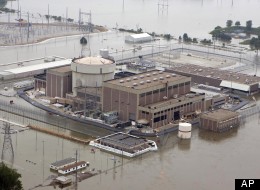According to the Huffington Post, not one, but two, whistleblower engineers at the Nuclear Regulatory Commission have accused regulators of deliberately covering up information relating to the vulnerability of U.S. nuclear power facilities that sit downstream from large dams and reservoirs and failing to act to despite being aware of the risks for years.
One plant in particular — the three-reactor Oconee Nuclear Station near Seneca, S.C. — is at risk of a flood and subsequent systems failure, similar to the tsunami that devastated the Fukushima Daiichi nuclear facility in Japan last year, in the event that an upstream dam fail.

The Fort Calhoun nuclear facility in Nebraska was surrounded by rising floodwaters from the nearby Missouri River in 2011.
Given the extreme weather patterns the world has seen in the last decade, that likelihood seems greater than it did when these plants were built.
A report, completed in July of 2011, after the earthquake and subsequent tsunami flooded the Fukushima Daiichi nuclear power plant was heavily redacted in a move, the whistleblower claims, to prevent the public from learning the full extent of these vulnerabilities, and to obscure just how much the NRC has known about the problem, and for how long.
The report examined vulnerabilities at the Oconee facility, the Ft. Calhoun station in Nebraska, the Prairie Island facility in Minnesota and the Watts Bar plant in Tennessee and concluded that the failure of one or more dams sitting upstream from several of these nuclear power plants “may result in flood levels at a site that render essential safety systems inoperable.” High floodwaters could conceivably undermine all available power sources, the report found, including grid power, emergency diesel backup generators, and ultimately battery backups. The risk of these things happening, the report said, is higher than acceptable and warranted a more formal investigation.
The heavily redacted copy of the report is publicly available on the NRC website.
Click here to read the Huffington Post’s entire investigatory story.


